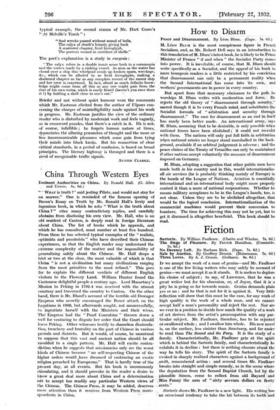China Through Western Eyes
" WHAT is truth ? ' said jesting Pilate, and would not stay for an answer." One is reminded of the famous opening of Bacon's Essay on Truth by Mr. Ronald Hall's lively and ingenious book, in which he asks " What is the truth about China ? " cites many contradictory replies, and carefully abstains from disclosing his own view. Mr. Hall, who is an old resident of Canton, is deeply read in foreign literature about China. The list of books which he appends, and which he has consulted, must number at least five hundred. From these he has selected typical examples of the " realists, optimists and pessimists " who have described their Chinese experiences, so that the English reader may understand the extreme complexity of the matter and the impossibility of generalizing safely about the Chinese. Mr. Hall drops a hint or two at the close, the most valuable of which is that China " is not a civilization but many civilizations ranging from the most primitive to the most refmed." This goes far to explain the different verdicts of different English visitors to the Flowery Land. William Hunter found the Cantonese delightful people a century ago. Lord Maeartney's Mission to Peking in 1792-4 was received with the 'utmost cerirtesy and traversed the country to Canton. -On the other hand, there is Mr. Bland's account of the terrible old Dowager }Impress who secretly encouraged the Boxer attack on the Legations in 1900, but afterwards sought, not unsuccessfully, to ingratiate herself with the Ministers and their wives. The. Empress had the " Pearl Concubine " thrown down a well for venturing to dispute her order that the Court should leave Peking. Other witnesses testify to shameless dissimula- tion, treachery and brutality on the part of Chinese in various periods and districts. But it would, of course, be unnatural to suppose that this vast and ancient nation should- be all moulded to a single pattern. Mr. Hall will excite contra- diction when he suggests that missionaries only see the worst kinds of Chinese because " no self-respecting- Chinese of the higher orders would have dreamed of embracing an exotic religion preached by Europeans." That is hardly true of the present day, at all events. But his book is uncommonly stimulating, and it should provoke in the reader a desire to know a great deal more about China and a determination net to accept too readily any particular Western views of the. Chine's The Chinese. Press,_ it laity be added, deserves more attention than it receives from Western Press vorrea sporidents in China.


































 Previous page
Previous page